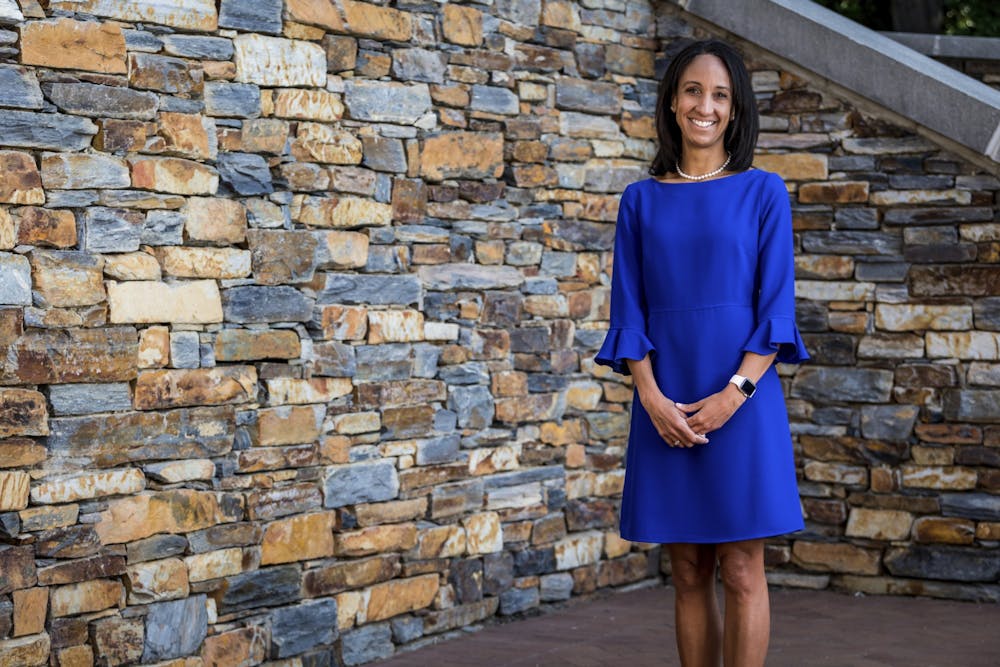Better the blue devil you know than the devil you don’t.
Duke’s Wednesday announcement that Nina King, current senior deputy athletic director, would be promoted to succeed Kevin White as athletic director, was met with strong praise. To say that she had been a coveted candidate would be an understatement; she was a finalist for Northwestern’s opening this year, per The Daily Northwestern, and was surely in consideration for positions at other top universities that could’ve opened up. And her promotion at Duke is a sign that the board of trustees has been more than happy with the athletic department these past 13 years.
In promoting King, Duke is committing to the strategies and directions that led it to ever-increasing successes under White. The raw numbers over his tenure speak for themselves—eight national championships and 29 ACC titles—but it's the improvement in Olympic sports that is the administration's biggest point of pride. In White's 13 years, Duke's Olympic sports (generally defined as everything except football and basketball) rose to conference and national contention across the board, including two women's golf NCAA titles, women’s tennis NCAA titles in both team and singles plus three other Final Four bids, three women's soccer college cups, women’s track and field’s first ACC championship, NCAA qualifiers from wrestling, fencing’s first ACC championships, two medalists in swimming and diving at the London Olympics and a new softball program with an ACC title in just its fourth year.
The board could've gone in a different direction with this hire. The university has never dedicated as much of its resources toward football as much as other ACC schools, and despite investments in upgrading the program's facilities, it's still a long ways off from returning to contention. Pulling the new athletic director from a strong football program would've signaled a change in attitude.
They also could've gone in the direction of the Pac-12, who just hired the president of entertainment and sports away from MGM Resorts in George Kliavkoff. With sports gambling quickly becoming legalized in more and more states, there are opportunities for schools to grow a relationship with betting markets, and to create revenue in that field. The Pac-12 is unique in that its revenue and viewership has been hamstrung by its TV deal, but Duke still could've committed to getting out ahead of the rest of the ACC in making inroads to that new money.
That's not to say that the board of trustees isn't betting on revenue growth—far from it. While the vast majority of Duke Athletics' overall budget is funded by net revenue from men's basketball and football, women's basketball, volleyball and softball are all sports that are becoming revenue-positive in more colleges across the country every year. Viewership in women’s basketball was up massively this March, volleyball is an untapped gold mine and softball is surging. None of these sports are likely to be put in a position to approach football and men’s basketball in terms of dollars raked in, but the real question is where the board’s priorities lie.
Duke's board of trustees have clearly taken great pride in the athletic department's overall performance; significant renovations have been made to Koskinen, Jack Katz, Cameron Indoor and Wallace Wade Stadiums, in addition to the construction of Morris Williams Track and Duke Softball Stadium. And the Blue Devils have finished outside the top 20 in the NACDA Directors’ Cup standings just twice under White, including four top-10 placements.
Duke is unique among all colleges in the United States: it is both an elite private university with a large endowment, one that grants the board of trustees great leeway with how it is able to allocate the school’s funding, and also an elite athletic institution, one that is nationally competitive in both Olympic and “big-time” sports. Stanford and many Ivys boast the endowment and the Olympic performance, but not the big-time sports. Florida and UCLA have the all-around sports, but not the endowment.
All of which is to say that Duke is uniquely able to compete for national championships, for TV time and advance the university’s mission all at the same time. Duke is truly its own frontier within college athletics, and on Wednesday, it decided to commit to its current path for the foreseeable future.
Editor's note: A previous version of this article did not include Duke swimming and diving's two medalists at the 2012 Summer Olympics. The Chronicle regrets the error.
Get The Chronicle straight to your inbox
Sign up for our weekly newsletter. Cancel at any time.

